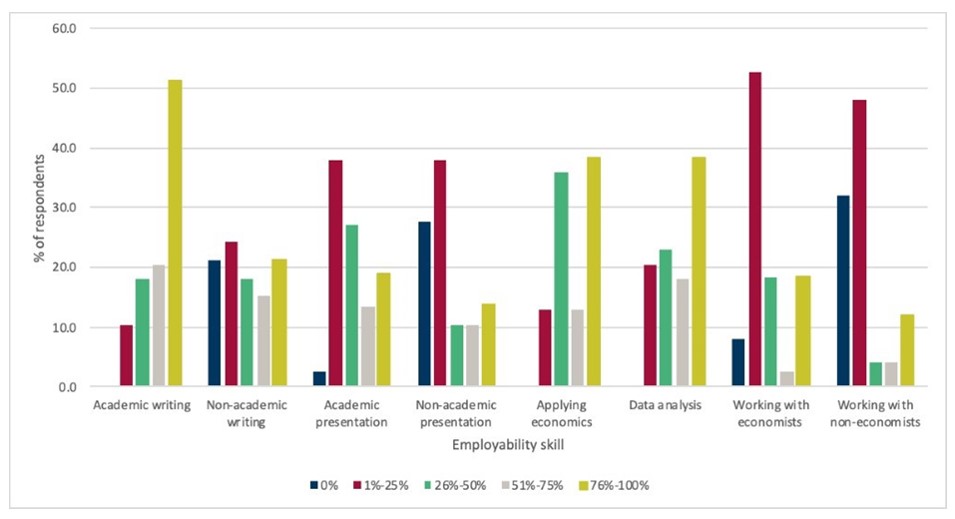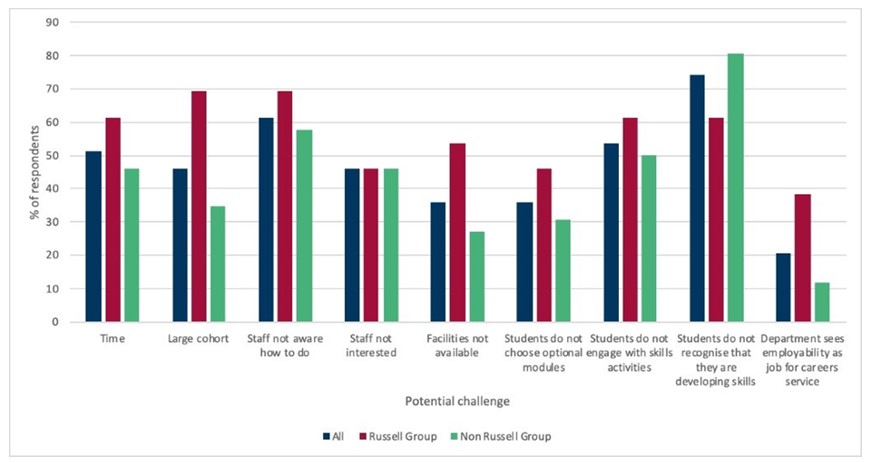Employability Skills in UK Economics Degrees - Executive Summary
Dr Cloda Jenkins, University College London
and Stuart Lane, The Economics Network Published October 2019
Introduction
In light of the increased policy focus on employability in higher education, and parallel criticism of economics degrees, this research report considers whether economics departments are providing sufficient targeted opportunities in their degrees for students to develop skills that are valued by employers. We do not make a judgement about whether degrees are the appropriate vehicle for developing employability skills, leaving that discussion for elsewhere, but instead focus on what the best approach to take is, assuming an economics department has made a choice to do more in this area.
We consider three inter-related research questions:
- Are there gaps between what departments are doing and what employers are looking for?
- Are the strategies used to develop employability skills in degrees effective?
- What challenges need to be overcome to improve skills development in degrees?
To answer these questions, we reviewed the literature on employability in higher education. Our understanding of employer requirements comes from the Economics Network Employer Surveys. Information about what is happening in economics degrees comes from our 2019 survey of economics departments, which was completed by 39 departments (out of a total of 95 eligible departments). We gained further insights from two focus groups involving employers, academics and students.
Our findings, given the nature of our methodology and information base, provide a descriptive indication of the current state of employability skills development in UK economics degrees. We have issues with small sample size and selection bias; however, we believe the research is valuable for our purpose which is to spark a fruitful conversation on how to practically improve the way that skills development is embedded in degrees. This report provides at least some evidence, not previously available, to inform those discussions. Moving conversations away from a critique of economics degrees to focus on what actions to take will benefit economics undergraduates in the UK.
Is there a gap between what employers are looking for and what is happening in degrees?
Economics departments and employers seem to largely prioritise the same skills areas, namely communication, application to the real world and data analysis. Both say that collaboration and wider employability skills, such as resilience, are also important but are less of a priority.
Figure 1: Comparison of employer and economics department priorities

However, as shown in Figure 1, employers say that economics graduates do not have high levels of skill in these areas. This may be because economics departments have only recently introduced activities designed to develop these skills and as a result there will be a lag before employers see improvements. The gap may also arise because economics departments interpret these skills in different ways to employers.
On communication, the focus is on traditional academic writing in degrees whereas employers are looking for both written and presentation skills aimed at non-expert audiences. Similarly, for collaboration economics departments focus, albeit in a limited way, on working with other economists whereas employers are looking for graduates who are confident working with colleagues from any discipline.
Considering data analysis, both employers and economics departments value strong technical/econometric skills. However, employers value more basis skills such as being able to find, clean and organise datasets, as well as being able to use Excel and coding software. There is some, but limited focus on these aspects of data analysis in degrees.
It is harder to say for sure how employers and economics departments vary in their interpretation of ‘application to the real world’. Employers are interested in graduates being able to analyse policy and commercial problems and being able to simplify complex ideas in an accessible way. Lecturers may explain to students how economics connects to real world issues rather than asking them to develop frameworks to analyse problems.
If an economics department wants to provide opportunities for students to develop skills that matter most to employers, it is not enough to read a list of employer priority skills. An in-depth discussion with employers is needed so there is a common understanding of what those skills mean in a work context.
Are the approaches that economics departments are using are effective for skill development?
The skill level of economics graduates may also be limited if the teaching and learning strategies being used are not effective for skills development. Figure 2 sets out the criteria, based on literature and ideas from our focus groups, that we think are needed for a degree to be effective in this area.
Figure 2: Criteria for effectively embedding employability skills development in degree

We find, based on the departments that responded to our survey, that there is a lot happening in economics degrees that is going in the right direction.
Economics departments are taking responsibility for employability skills, working with careers services and societies. Yet, it is unclear how much is coordinated within the degree.
Around 60% of those surveyed had a placement experience as part of the degree. In most cases these were optional or not available to all students. It is unclear to what extent activities in modules are closely related to what happens ‘on the job’. Although case studies provided suggest there are good examples out there, the focus groups suggest it is not the norm.
Opportunities for the development of academic writing, applying economics and data analysis are provided, according to our survey respondents, in economics modules rather than bespoke skills or careers modules. The opportunities are generally provided across all years of the degree, with a slight increase in the final year. These skills appear to be developed over time alongside economics content. Opportunities to develop other skills are less frequent but still spread across years and still mainly within economics modules.
Figure 3: Skills development in the classroom

Figure 4: Skills development through take-home activities and closed-book exams

As shown in Figure 3 and Figure 4, small group classes are the main vehicle for developing skills, although many of those surveyed also say that skills are developed in large lectures. Whether or not the skills are genuinely developed depends on how active students are in those classroom settings. A mix of independent learning activities, including closed book exams, are used to develop skills. It is difficult to say how effective these activities are without further information on precisely what students are asked to do. A closer look at the outputs that students produce shows that there is a strong preference for traditional academic-style essays and presentations. Our focus groups were also sceptical that closed book exams were a reasonable way to assess work-relevant skills.
Figure 5: Percentage of work linked to skill that is summatively assessed

Amongst those that responded to our survey it appears that much of the skills development happens in compulsory modules. It is not clear however whether the activities themselves are considered compulsory. As shown in Figure 5, a high proportion of activities are assessed for academic writing, applying economics and data analysis, which suggests that the incentives to engage should be there. However, it may be the case that only a part of a question links to the skills and may be given less attention by students. Indeed, students may not fully understand how the assessment and skills development connect.
There may be a need to redesign activities, used in the classroom and for independent study, so that they are genuine opportunities for work-related skills development. The nature of assessment, and how clear the importance of skills development in that assessment is, also warrants further consideration.
What are the challenges of doing more and doing it effectively?
Is it by no means an easy task, for an individual lecturer or a whole department, to effectively embed employability skills development into an economics degree. The main challenges, shown in Figure 6, are difficulties with getting students to engage and incentivising and supporting staff.
Figure 6: Percentage of respondents who agreed challenge was a problem or significant problem
 Our focus groups suggest that students are more likely to engage if lecturers are transparent about what skills are being developed and explain clearly the connections between skills development and (assessed) activities inside and outside the classroom. Employers can help by explaining to students why it is important to develop skills and assuring them that skills development in the degree is valued.
Our focus groups suggest that students are more likely to engage if lecturers are transparent about what skills are being developed and explain clearly the connections between skills development and (assessed) activities inside and outside the classroom. Employers can help by explaining to students why it is important to develop skills and assuring them that skills development in the degree is valued.
On supporting and incentivising staff, promotion criteria linked to REF-able research is a difficult hurdle to overcome. More can be done to limit the time and effort required. Encouraging lecturers to use approaches linked to their own research skills may be a good starting point. Establishing processes to make it easier to connect with employers and developing open-source teaching materials that are aligned with what happens ‘on the job’ may also help. These support structures can help lecturers to work out what to teach and how to teach without needing to make significant trade-offs between content and skills.
Next steps
Great efforts are being made by the economics departments in our survey to embed the development of employability skills in their degrees. We hope that this research project provides ideas for further progress. Employability case studies, published on the Economics Network’s website, provide practical insights on what can be done. We will also include a chapter on employability skills in our Handbook for Economics Lecturers. Finally, we recommend that the economics education community takes steps to engage with employers more regularly and effectively going forward. The Economics Network welcomes ideas on how this might be facilitated.

